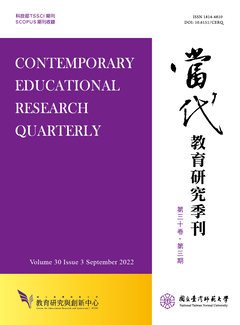

研究目的
本研究旨在瞭解國高中教師對108 課綱內蘊的共治共學觀之認知(含分享決定與社群共學)與課綱變革意向(含喜好度與行為意向),並探討教師的共治共學觀影響其變革意向的路徑。
研究設計/方法/取徑
採問卷調查法,針對全國公立國高中進行抽樣,以1,195 位教師作為研究對象。以變異數分析呈現教師在108 課綱內蘊之共治共學觀與課綱變革意向上的差異;以群集分析進行不同能動性教師之分群;將教師能動性作為調節變項,進行「共治共學觀—變革喜好度—變革行為意向」影響路徑的調節式中介分析。
研究發現或結論
研究結果顯示,國高中教師對108 課綱的共治共學觀與變革意向具正向認同感。在以能動性區分教師類型時,發現有超過半數教師屬於「光知不練型」,這群教師具備高共治共學觀,變革意向卻較低。另有兩類教師約各佔兩成二:「勇於履行型」在共治共學認知上相對較弱,但展現最大的行動趨力;「眼高手低型」教師則對共治共學與變革喜好有較高的認同,只是未能化成行為動能。在共治共學觀對變革意向的作用上,共治共學觀中的「社群共學」要較「分享決定」來得大。而在調節式中介分析中,「分享決定」與「社群共學」在三類教師中均呈現了透過變革喜好度的中介而影響新課綱實踐意向的路徑;二者也顯示其對「變革喜好度」的直接影響;而「分享決定」對「變革行為意向」的直接效果,在「光知不練型」的教師群體中不顯著,卻出現於其他兩類教師群體中。
研究原創性/價值
108 課綱是近年的重大教改政策,現今對此政策進行的實徵研究尚不多。本研究考量分享決定與社群共學是推動十二年國教課綱的重要助力,故以共治共學觀作為探討變革意向的自變項。在研究方法上,以生態觀點界定能動性,將其視為個體與外在環境互動下展現對於變革的行動趨力,在群集分析後,得到「光知不練型」、「眼高手低型」及「勇於履行型」三種教師能動性的展現樣態,並以教師群集作為調節變項進行調節式中介分析,檢視「共治共學觀—變革喜好度—變革行為意向」影響路徑在三個不同教師能動性群集中是否有差異。此作法一方面別具特色,一方面也讓研究結果更具實務性意義。本研究所獲結果,對於如何培力具不同能動性之教師迎向變革,提供了更具方向性的啟示。
Purpose
In the context of the 12-Year Basic Education curriculum reform, this study aimed to investigate how teachers conceptualize shareddecision-making, collective learning, and change intention (affection and behavior intention for change). Additionally, it was examined how teachers’ conceptions of shared decision-making and collective learning influenced their change intention.
Design/methodology/approach
Data were collected from teachers serving at the public junior and senior high schools in Taiwan using a survey questionnaire. A total of 1,195 valid responses were used for data analysis. Analyses of variances were used to examine the differences in teachers’ conceptions of shared decision-making and collective learning, affection for change, and behavioral intention for change. We also investigated how teachers might be classified with varying degrees of agency. Furthermore, a moderated mediation analysis was conducted to analyze the paths of “conceptions of ‘shared-decision making and collective learning’-affection for change-behavior intention for change” among teachers in three clusters as moderators.
Findings/results
The findings revealed that teachers had positive receptivity for shared decision-making, collective learning, and change intention. Three clusters of teachers were found with different degrees of agency. More than half of the teachers belonged to the cluster of being “all mouth and no trousers.” Teachers in this cluster demonstrated high cognition of shared decision-making and collective learning but low affection and behavioral intention for change. The other two clusters were “having grand ideas but little action” and “having the courage to fulfill.” With lower cognition, teachers in the “having the courage to fulfill” cluster acquired the most decisive intention for action. However, teachers in the “having grand ideas but little action” cluster had relatively high cognition and affection but low motives to practice. Concerning the impact of teachers’ cognition on the intention for change, we found that the dimension of “collective learning” had a more significant influence than that of “shared decision-making.” When conducting the moderated mediation analysis, the dimensions of “collective learning” and “shared decision-making” were found with direct effects on affection for change. Both impacts on the change intention were partially mediated by affection for change. Besides, “shared decision-making” had no significant impact on the change intention in the “all mouth and no trousers” cluster; however, the impact appeared in the two other teacher clusters.
Originality/value
The curriculum reform of the 12-Year Basic Education is Taiwan’s most crucial education policy in recent years, but there are limited studies on the new curriculum reform. Given the significant role of shared decision-making and collective learning in implementing the new curriculum, we linked them with teachers’ intention for curriculum reform. Besides, an ecological perspective of the agency was employed. Agency is the drive for a change resulting from the interplay of the individual and the complex external environment. Through cluster analysis, three clusters of teachers with different degrees of agency were found. We labeled them as “all mouth and no trousers,” “having grand ideas but little action,” and “having the courage to fulfill.” With the teacher clusters as moderators, a moderated mediation analysis was conducted to examine the path of “conception of ’shared-decision making and collective learning’- affection for change-behavior intention for change.” The statistical methods provide sophisticated analysis for the relationship among the variables and derive practical implications. This study contributes to a more precise direction regarding empowering school practitioners with different degree of agency to embrace curriculum change.

This work is licensed under a Creative Commons Attribution-NonCommercial 3.0 Taiwan License.
Center for Educational Research and Innovation, National Tawain Normal University
162, Ho-Ping East Rd, Sec. 1, Taipei, Taiwan | Tel:+886-2-7749-3670 | E-mail: cerecerq@gmail.com
CERI | NTNU | E-mail Alerts | Open Journal System
© 2014 CERI-NTNU
